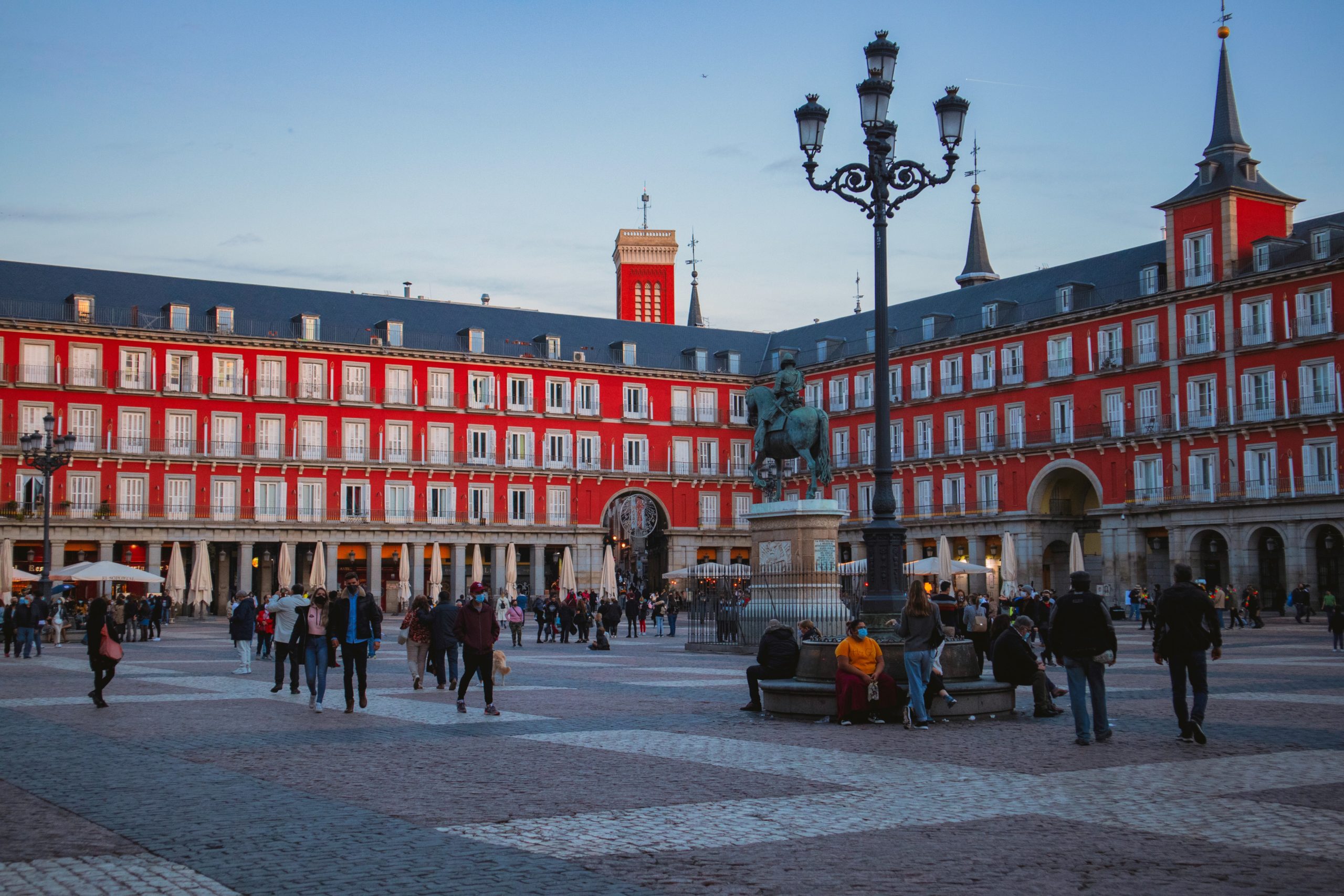
Look Down in Lock Down:
Good Believers & Good Citizens in Europe amidst the Pandemic
Andrea Pin
Photo by Eduardo Rodriguez on Unsplash.
This article is part of our “Law and Religion Under Pressure: A One-Year Pandemic Retrospective” series.
If you’d like to check out other articles in this series, click here.
Europe has been an epicenter of the pandemic. It has drawn a lot of attention due to how rapidly and deeply it was affected by COVID-19 shortly after the virus’s discovery in China. What has happened since the outbreak of the pandemic has changed the Old Continent’s face and vision in many ways, and may exemplify how the virus challenges law and religion — as well as how the relationship between the two has been evolving to adapt to the new circumstances. Time will tell if such changes are temporary or here to stay.
The Virus and the European Integration
How countries are reacting to the virus is critical for the survival of the European integration and even the peaceful coexistence of many peoples. Since the virus made its way at different paces across Europe, European countries have responded in a variety of ways, each declaring lockdowns or easing them depending on the fluctuation of the pandemic and the capabilities of their healthcare systems. As a result, Europe has turned into a patchwork of areas within which you could either go or not go to school; eat or not be allowed to eat in restaurants; visit or not be allowed to visit friends; and be able or not able to access hiking areas. EU institutions have been mainly pursuing three goals, leaving the rest of the responsibilities to its state members: 1) persuading nations not to close borders indefinitely; 2) financing the recovery in a substantial way, which has no precedent in EU’s history; 3) trying to provide vaccines for the entire EU population — an effort that so far has proven largely unsuccessful, to the extent that many EU states have gone in different directions seeking vaccines for their own populations after the European Commission failed to secure adequate supplies for everyone. The virus and its consequences have been a formidable test for the European integration and the mentality, culture, society, and law that drove its development.
The 2008-2009 global economic crisis shook the vision of a unified Europe as a place of wellbeing, prosperity, peace, and opportunity. The collapse of the economy drew into question the widespread belief that our social and political systems will inevitably achieve more wealth, develop stronger social interactions, and become more global. But the pandemic struck a blow that went even deeper into the heart of post-modern Europe. Years of freedom of movement disappeared; Erasmus mobility was frozen; pan-continental economic exchanges were stopped; people were forced to stay at home or within their immediate surroundings. Many lost their jobs; others saw their income suddenly fall, bringing them to the brink of poverty or into it. Long story short, the pandemic challenged the fundamental features around which the EU developed in the post-World War II scenario: a unique experiment of nations putting together their lives, economies, job markets, educational systems, and capitals for the benefit of all, while tearing down country borders.
The European Integration, its Religious Spirit, and Their Crisis
As Joseph Weiler has pointed out, the European integration’s achievements owe much to Christian spirituality. This is not to say that Europe is for Christians alone, of course, but that the modern Christian mindset has been extremely influential in substantial ways, though this influence seldom surfaces explicitly. The belief in progress — the call for unity to overcome the national boundaries, an attitude of tolerance toward others, the widespread acceptance, and even desire, to voluntarily curb state power to give way to a supranational political body, and to yield to other countries’ interests for the sake of peace and a broader prosperity — was forged in a crucible to which Christianity greatly contributed. Contemporary Europe may have lost much of its Christian roots — but these were certainly the fabric wherein it took shape.
The virus and its consequences have been a formidable test for the European integration and the mentality, culture, society, and law that drove its development.
The pandemic took the challenge to the religious spirit of Europe to another level. It is one thing for the Europeans and their political institutions to forget their own identities; it is another thing when a fact materializes, challenging the great ideals that shuffled their spirit into the European integration. The virus suspended the physical and social mobility; froze the economy; showcased the huge welfare disparities among member states that the post 2009-crisis’s EU austerity measures had already widened; and forced the member states to look for a vaccine without European coordination. In doing so, it attacked the institutions and liberties that the religious spirit helped build. The pandemic crisis is a challenge as well as a chance for Europeans to think harder about the spiritual drivers behind the European integration, the shapes spirituality can take during the pandemic, and whether both can survive the virus.
The Religious Sense of Europeans and Their Fight against the Pandemic
When their world turned upside down in 2020, many Europeans were caught with an unprecedented sense of despair, loneliness, pain, and fear. After all, people infected with the virus monopolized hospital facilities. At one point, in Italy the dead were so many that the army was mobilized to move the bodies where they could be burnt quickly and safely. A renewed interest for religion and spirituality would not have come as a surprise: the Polish prime minister even declared that churches are “spiritual hospitals for the soul” during the pandemic.
Interestingly enough, however, religious practice has not really become one of the political priorities for Europeans even during the pandemic. Law and fear have proven a deadly combination for some religious traditions. Although the applicable rules have fluctuated alongside the pandemic, legal constraints have generally limited religious gatherings, even suspending key celebrations such as Easter festivities in 2020.
During the pandemic, the variety of constitutional church and state relationships have not always engendered significantly different regimes for religious celebrations. Christian majorities in secularist France, confessional England and Wales, religious-friendly Germany, and traditionally pro-Catholic Ireland, Italy, and Spain have all had their good measure of constraints on religious ceremonies. Counterintuitively, however, it is actually the case that some countries displaying a stricter state neutrality have been more proclive to religious gatherings than countries with an official religion or a strong identification with a specific religious tradition (see map here).
The pandemic challenged the fundamental features around which the EU developed in the post-World War II scenario: a unique experiment of nations putting together their lives, economies, job markets, educational systems, and capitals for the benefit of all, while tearing down country borders.
The social visibility of traditional churches and the special place that many enjoy within several constitutional settings have not always encouraged them to negotiate special allowances either for their believers or religious practices more broadly. Catholics — as well as a smattering of Protestant denominations in Scotland, who emphatically stated that to find something comparable to the current anti-pandemic restrictions one had to go back to the “persecution of the Presbyterian church, instituted by the Stuart kings, in the 17th century” — may have been more vocal than the national Church in requesting that the government ease restrictions. Interestingly, however, when religious people and organizations have been confident enough to sue the state in courts for the limitations they suffered from, the rulings were quite surprising. In secularist France, national courts have found religious freedom to be so fundamental that any limitation needs to be strongly justified in order to be legitimate. Italy, which has a much more favorable constitutional treatment of religious freedom, has seen comparable limitations, but none have been struck down in court so far. German Churches, whose freedoms have also been curtailed, have lost their legal battles. The Court of Session gave the upper hand to 27 Protestant churches that sued the Scottish Government for closing places of worship and criminalizing those to attend, as it found that the restrictions disproportionately limited religious freedom under Art. 9 of the European Convention of Human Rights.
The meaning of religion
Within the EU territories, the variety of state limitations on religious freedom, religious organizations’ reactions, and judicial rulings on the matter is telling of how the virus and the social crisis in Europe are mobilizing state constitutional canons and pushing people to reconsider their priorities. Underneath the surface, the issue of what human beings need today is what is at stake.
In his tour-de-force volume A Secular Age, Charles Taylor stated that modernity has provided the West with an “Immanent Frame,” within which an “immanent order can thus slough off the transcendent.” (Charles Taylor, A Secular Age, 2007, 543). Within such an order, “[w]e don’t know how to deal with death, and so we ignore it as much” (Ibid., 723). But what we Europeans have been seeing since the outbreak of the pandemic is simply too big and too sad to simply shut our eyes and ignore it.
A renewed sense of transcendence can reinvigorate the need for religious freedom and force state institutions to reconsider their constraints on religious practices. There are already visible signs that this virus is remapping the relationship between state, religions, and religious freedom, such as in France, which has seen courts acknowledging the importance of religious worship and easing government restrictions as a consequence.
The lessons to be learned
The pandemic presents both a challenge and a chance — although certainly a very painful one. It may push states to reconsider their constitutional priorities to include religious freedom; populations to re-appreciate how the EU relies on the religiosity of Europeans; and law and religion to realize how deeply intertwined the two disciplines are. ♦

Andrea Pin is Associate Professor of Comparative Public Law, University of Padova Law School, and Senior Fellow in the Center for the Study of Law and Religion at Emory University.
Recommended Citation
Pin, Andrea. “Look Down in Lock Down: Good Believers & Good Citizens in Europe amidst the Pandemic.” Canopy Forum, April 5, 2021. https://canopyforum.org/2021/04/05/look-down-in-lock-down-good-believers-good-citizens-in-europe-amidst-the-pandemic/

